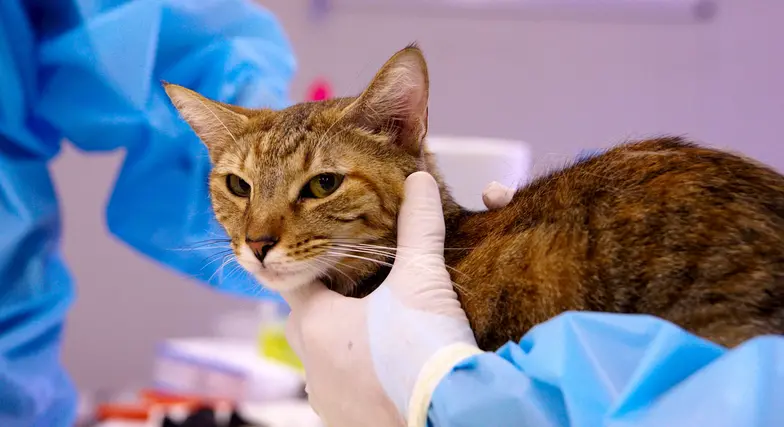Feline Immunodeficiency Virus (FIV)

Feline Immunodeficiency Virus (FIV) compromises the immune system in cats, making them more susceptible to infections. While FIV is similar to Human Immunodeficiency Virus (HIV), it can only infect cats, and there is no risk of transmission to humans. Any cat can be infected, but FIV is most commonly diagnosed in intact, outdoor male cats. With proper care, infected cats typically have an average lifespan and a good quality of life.
Prevention
FIV is not considered a population risk in shelters, but screening cats who will be co-housed with unfamiliar cats is important. FIV-positive cats can be safely housed with the general shelter population if they have individual housing units or small group housing with other FIV-positive cats or previous housemates. Because FIV can cause immune suppression, extra care should be taken to avoid handling unhealthy cats before handling FIV-positive cats.
FIV is most commonly spread through biting. It is very important for FIV-positive cats to be altered, especially males, to help reduce the incidence of fighting. No vaccine is available in the United States or Canada (one was removed from the market in 2015); however, a vaccine is available in other countries.
FIV is short-lived in the environment and does not spread through casual handling of infected cats. Routine sanitation will prevent transmission of retroviruses, including FIV.
Clinical Signs
FIV-infected cats can live for many years without signs of disease. Illness is typically related to other infections, such as upper respiratory infections, because of the cat’s compromised immune status. FIV-positive cats develop severe dental disease, dermatitis, and cancer more frequently than non-infected cats. FIV should be investigated if a cat has a recurrent or chronic infection or is not responding to treatment as expected.
Transmission
The primary mode of FIV transmission is via bite wounds. Sexual contact does not appear to be a significant route of transmission, and it is uncommon for an infected queen to transmit FIV to her kittens.
Diagnosis
The most common diagnostic test for FIV is a combination FeLV/FIV point of care (POC) screening blood test that detects FIV antibodies. False positive results are uncommon, especially when testing is limited to sick or exposed cats. Infection can be confirmed via PCR in the unlikely situation that confirmation of a positive test is needed.
Kittens may receive FIV antibodies through nursing, so testing kittens less than 6 months of age for FIV is not recommended. If a kitten tests positive, they should be retested at 60-day intervals until 6 months of age. If still positive at 6 months, the kitten should be considered infected.
Note About Testing in Animal Shelters
The decision to test cats for FIV in a shelter must consider the allocation of resources. Because the prevalence of infection in healthy cats is relatively low, shelters may elect to limit testing to situations where the diagnostic value will be most beneficial. Adopters should be made aware if cats were not tested in the shelter so they can alert their veterinarian.
Testing Recommendations
| Healthy, individually housed cats | Optional |
| Unhealthy cats (bite wounds, not responding to treatment, etc.) | Recommended |
| Group housed cats | Recommended |
| Foster cats | Optional |
| Blood donor cats | Essential |
| TNR cats | Not Recommended |
Treatment/Management
Individual Animal Care
There are no specific treatments for FIV infection. If an FIV-infected cat begins showing clinical signs of secondary infections, these should be treated as appropriate for the infection. These cats may require longer courses of treatment to clear infections.
Infected cats can live for many years without clinical signs of disease. The most important management tool is reducing the risk of illness through regular preventive care, veterinary visits, and a well-balanced diet. Maintaining a low-stress environment for these cats is important since stress can increase susceptibility to illness.
Foster and Adoption Considerations
FIV-infected cats can be considered for foster and adoption programs, and marketing and education can prevent prolonged lengths of stay. FIV-infected cats can be placed in a home with other FIV-infected cats. In addition, the risk of transmission between compatible neutered adult cats is low, so well-informed foster caregivers and adopters may consider bringing an FIV-infected cat into their home where an uninfected adult cat is already present.
Resources & Downloads
- ASV Position Statement on FeLV and FIV Testing and Management in Animal Shelters
- AAFP Feline Retrovirus Testing and Management Guidelines
- Infectious Disease Management in Animal Shelters Textbook
- Webinar: Who Should I Be Testing? Untangling the Mystery of FeLV and FIV in Shelter Cats
- FIV Testing and Management Sample Protocol
We have lots more on this subject:
